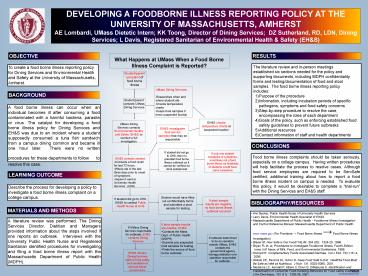48x36 poster template - PowerPoint PPT Presentation
1 / 1
Title:
48x36 poster template
Description:
A food borne illness can occur when an individual becomes ill after consuming a ... a student supposedly consumed a tuna fish sandwich from a campus dining common ... – PowerPoint PPT presentation
Number of Views:98
Avg rating:3.0/5.0
Title: 48x36 poster template
1
DEVELOPING A FOODBORNE ILLNESS REPORTING POLICY
AT THE UNIVERSITY OF MASSACHUSETTS, AMHERST AE
Lombardi, UMass Dietetic Intern KK Toong,
Director of Dining Services DZ Sutherland, RD,
LDN, Dining Services L Davis, Registered
Sanitarian of Environmental Health Safety
(EHS)
OBJECTIVE
RESULTS
- The literature review and in-person meetings
- established six sections needed for the policy
and - supporting documents, including MDPH
confidentiality - forms and testing/documentation of food and stool
- samples. The food borne illness reporting policy
- includes
- Purpose of the procedure
- Information, including incubation periods of
specific pathogens, symptoms and food safety
concerns - Step-by-step procedure to resolve the case,
encompassing the roles of each department - Goals of the policy, such as enforcing
established food safety guidelines to prevent
future outbreaks - Additional resources
- Contact information of staff and health
departments
To create a food borne illness reporting policy
for Dining Services and Environmental Health and
Safety at the University of Massachusetts,
Amherst.
BACKGROUND
A food borne illness can occur when an individual
becomes ill after consuming a food contaminated
with a harmful bacteria, parasite or virus. The
catalyst for developing a food borne illness
policy for Dining Services and EHS was due to an
incident where a student supposedly consumed a
tuna fish sandwich from a campus dining common
and became ill one hour later. There were no
written procedures for these departments to
follow to resolve this case.
CONCLUSIONS
Food borne illness complaints should be taken
seriously, especially on a college campus.
Having written procedures will help facilitate
the process to resolve cases. Although food
service employees are required to be ServSafe
certified, additional training about how to
report a food borne illness incident on campus is
needed. To evaluate this policy, it would be
desirable to complete a trial-run with the
Dining Services and EHS staff.
LEARNING OUTCOME
Describe the process for developing a policy to
investigate a food borne illness complaint on a
college campus.
BIBLIOGRAPHY/RESOURCES
MATERIALS AND METHODS
- Ann Becker, Public Health Nurse of University
Health Services - Larry Davis, Environmental Health Specialist of
EHS - Massachusetts Department of Public Health -
Foodborne Illness Investigation - and Control Reference Manual. Massachusetts
Department of Public Health - www.mass.gov (For Providers ? Food Borne
Illness ? Food Borne Illness - Investigation)
- Blaser M. How Safe is Our Food? NEJM 334 (20)
1324-25, 1996. - Bryan FL et. al. Procedures to Investigate
Foodborne Illness, Fourth Edition. - Iowa Intl Assoc of Milk, Food, and
Environmental Sanitarians. 1988. - Dwivedi R. Complementary Foods Associated
Diarrhea. Ind J Ped. 73(1) 61-4, - 2006.
- Woteki CE, Facinoli SL, Schor D. Keep Food Safe
to Eat Healthful Food Must - Be Safe as Well as Nutritious. J Nutr 131
502S-509S, 2001. - Medeiros LC, Kendall P, Hillers V, Chen G,
DiMascola S. Identification and - Classification of Consumer Food-Handling
Behaviors for Food Safety Education. - J Am Diet Assoc. 101 (11) 1326-39, 2001.
A literature review was performed. The Dining
Services Director, Dietitian and Managers
provided information about the steps involved if
one reports an outbreak. Interviews with the
University Public Health Nurse and Registered
Sanitarian identified procedures for
investigating and filing a food borne illness
report with the Massachusetts Department of
Public Health (MDPH).

